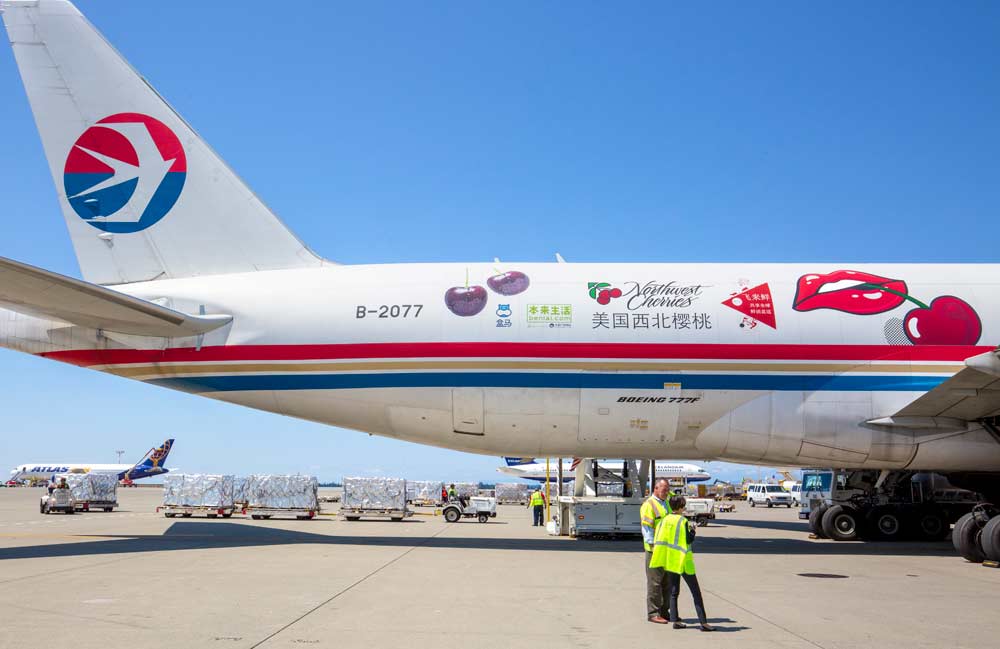
Ken Galka, air cargo operations manager for the Port of Seattle, speaks to Catherine Wang, North American general manager of China Cargo Airlines, while the China Express is loaded with fresh cherries from the Pacific Northwest at Sea-Tac International Airport in Seattle, Washington, on July 12, 2017. The Northwest sent 3 million boxes to China last year. (TJ Mullinax/Good Fruit Grower)
Calling for a modestly sized 2018 crop, cherry growers from the Pacific Northwest are casting a wary eye toward China, last year’s largest export market, in light of international trade disputes.
Sweet cherry growers from five Northwest states predicted a 2018 crop of 20.4 million 20-pound box equivalents at an annual industry meeting Wednesday in Richland, Washington. If that figure holds it would be much lower than last year’s record of 25.4 million boxes and below the three-year average.
Washington growers expect to harvest 83 percent of that total.
But trade relations between the United States and China dominated most of the conversation Wednesday at the gathering, typically called the Five-State Meeting.
In response to President Donald Trump’s tariffs on steel and aluminum, China has imposed a 15 percent tariff on fruit and vegetables, including cherries. That would come in addition to the current 10 percent import duty and a 13 percent value-added tax for a total of 38 percent in extra costs.
However, Chinese customers would still buy cherries if they could get them consistently, said Keith Hu, director of international operations for Northwest Cherries, an organization based in Yakima, Washington, that markets sweet cherries for growers in the states of Washington, Oregon, Idaho, Montana and Utah. Most of the customers are middle to upper class and retail stores are still interested.
The bigger problem is delaying shipments by insisting on inspections for pest and disease concerns that Hu considers political excuses. For example, they have already this year delayed California shipments for Prunus necrotic ringspot virus, a disease that already exists in China.
“Honestly, they’re just playing dirty,” he said.
Other industry representatives suspect the same. For example, Chinese officials quarantined a load of export cherries coming out of San Francisco for eight days “just because they can,” said Debi Rosales, export manager for Apexlogistics of Seattle. Fresh cherries don’t last that long.
Likewise, Kate Woods of Northwest Horticultural Council, a Yakima organization that represents fruit in international trade and federal government issues, suspect the quarantines are political maneuvers.
Her organization is working with the Trump administration to resolve the dispute as quickly as possible, she said.
Last year, the Northwest shipped 3 million boxes to China, about 12 percent of its crop.
Hu has not given up hope on China. Many importers are still on board for promotions, but he is developing contingency plans to promote more aggressively in other markets such as Korea, Southeast Asia, the United Kingdom and Mexico, just in case, he said.

Thousands of pounds of Pacific Northwest grown cherries wait to be loaded into Korean international cargo flights from the neutral apron loading areas at Sea-Tac International Airport on July 12, 2017. (TJ Mullinax/Good Fruit Grower)
—by Ross Courtney






Leave A Comment